Stupid travel “ban” tricks
How Trump characterizes the travel order is legally irrelevant.
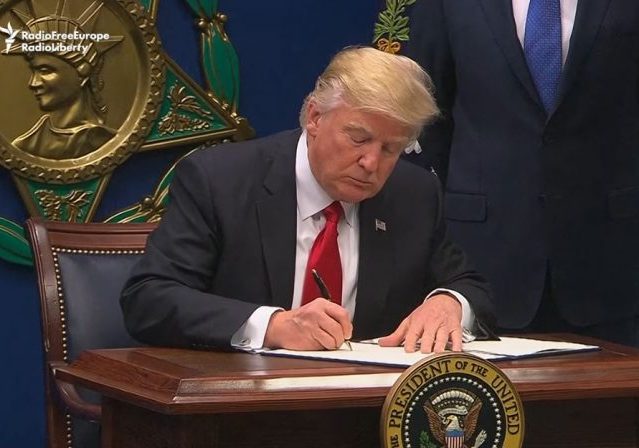
There he went again.
Early this morning Donald Trump launched a twitter storm regarding the issue of the Executive Orders regarding visa entry to the U.S. from 6 (originally 7) majority Muslim nations previously identified by the Obama administration as posing unique security risks.
On January 28, 2017, just after the first Executive Order, I addressed much of the nonsense in the media about the substance of the Executive Order, Most claims about Trump’s visa Executive Order are false or misleading. Most significantly, it was inaccurate to describe it as a “Muslim ban,” which was the media descriptor of choice.
After numerous court losses, the Trump administration decided to fold the tent on Executive Order No. 1, and issue a watered-down version intended to mollify judicial hostility rather than taking the case to the Supreme Court. I thought that was a grievous error, President Trump must not back down on immigration Executive Order:
I have seen many analyses critical of the 9th Circuit ruling which urge the Trump administration to take a step back, to withdraw the current Executive Order and rewrite it to fit what is acceptable to the 9th Circuit. The Trump administration, according to some reports, is considering doing that.
That would be a grievous mistake.
The Executive Order, as the Trump administration has said it would be enforced (for example, excluding green card holders from its reach), is perfectly lawful and within the President’s power and authority. To accept the 9th Circuit ruling is to accept that the President does not have the powers vested in him by the Constitution and Congress.
This legal dispute no longer is just about the Executive Order. Democrats have made clear that they will fight in court over almost everything the Trump administration does. The 9th Circuit has opened the door to this tactic on an issue that goes to the core of presidential authority.
If the Courts are to designate themselves the functional directors of the Department of Homeland Security, then such mandate must come from the Supreme Court, not the 9th Circuit.
We’re now at the Supreme Court, on Order No. 2, after patently absurd reliance by the 4th Circuit on Trump’s campaign statements. It is anticipated that this month the Supreme Court will rule both on Trump’s request to take the case, and his request to reinstate Order No. 2 pending hearing of the case.
Which brings me back to Trump’s tweet storm. He tweeted not only that there was nothing wrong with calling it a “ban,” but also that he regretted abandoning the original order.
Whether Trump calls it a “ban” or not is legally meaningless, just as Trump not calling it a ban also would have been legally meaningless. The travel order is what it is. There’s a reality that does not depend on how politicians, media, pundits, or social media users (or even blog commenters!) characterize it.
And the reality is that it’s not a “ban” on travel. The people who are abroad with no legal right to enter the U.S. can travel, just not here. Only if we consider that open borders is a right could controlling our border entry be deemed a travel ban.
So why are people making such a big deal about the use of the term “ban”? Because they are, deliberately in some cases, ignorantly in others, eliding “Muslim Ban” with “Travel Ban.”
That’s what the ACLU did:
That’s what Chris Cuomo did in this particularly dumb hot take on CNN:
Northwestern Law Professor Eugene Kontorovich pointed out the distinction Cuomo missed, the legal issue never was whether it was a “ban,” but what type of “ban”:
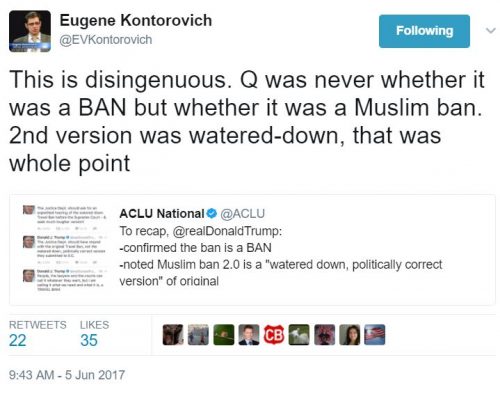
Law Professor Josh Blackman, while finding the tweets unwise, also finds the terminology in dispute legally irrelevant:
Finally, much ado has been made today about the fact that he called it a “travel ban” and referred to the current version as “watered down.” This is not new language from Trump. The plaintiffs have read his previous reference to the “watered down” order to refer back to his original promise on the campaign trail to ban all Muslims, but for reasons I discuss in Part I of my series on IRAP v. Trump, this is not a plausible construction of his entire remarks from that speech.
That said, Trump’s use of the word “ban” raises questions. During a January 31 press conference, a reporter asked Sean Spicer about the President referring to it as a “ban.” Spicer denied that it was a ban, citing Homeland Security Secretary Kelly’s statement to the contrary. It is remarkable that the President’s own cabinet cannot get on the same page as the President. Why did Trump call it that? “He’s using the words that the media is using,” Spicer replied. The reporter followed up “It’s his words, his tweet.” Spicer replied, “I think that the words that are being used to describe it are derived from what the media is calling this. He has been very clear that it is extreme vetting.” This phrase, “extreme vetting,” is also how Trump described the order in his final tweet this morning.
What does all of this mean for the Supreme Court’s resolution of IRAP v. Trump? Under Kerry v. Din and Kleindienst v. Mandel, the Court’s review for legitimacy and bona fides is limited to the four corners of the policy. If the Justices abide by those precedents, none of these statements will be relevant.
Kontorovich goes as step farther, and argues Trump’s travel tweets do not hurt the legal case for his executive orders:
Trump’s tweets were certainly Trumpian in tone, and the criticism of his own Justice Department for submitting an executive order he signed does not make him look good. But there is nothing in these tweets that should weaken the Solicitor General’s case before the Supreme Court, or that supports the view that the policies were unconstitutional because of an impermissible motive on the president’s part….
Commentators are reacting as if Trump said that the revised version is a “watered down” Muslim ban. He did not. He said it is a watered down version of the first order, which everyone already knew….
Finally, the tweets may actually bolster the government’s legal case (rather than purposefully undermine it, as Jack Goldsmith suggested). The tweets imply that Trump had little or no role in the drafting of the current executive order — the Justice Department is responsible. If we accept that, then any animus that may infect him would not attach to the order of which he is not the author, unless one is to say the administration is generally disabled from carrying out non-permissive immigration policies with respect to a quarter of the world’s nations. And if one does not take his statement that the Justice Department is responsible for the order to mean the most it can mean, how can one read his campaign statements for their maximal, and worst, possible meaning?
So, assuming the Justices focus on the legal issue, which is the president’s authority and the extraordinarily narrow judicial review, Trump’s characterization of the Order as a “ban” should have no impact.
But there’s another point, which is not really a legal point. The Justices certainly are aware of the firestorm kicked off by the tweets. We know that Ruth Bader Ginsburg already has a dim view of Trump’s credibility and style, as I wrote in How can Ginsburg participate in Travel Order case after her *campaign* statements about Trump?
The tweets appear to be taunting the Supreme Court, as George Conway (Kellyanne’s husband, who at one time was under consideration for Solicitor General) noted:
So no, I don’t think these tweets help Trump. I agree that Trump would be an impossible client to represent for this very reason. But perhaps he understands that this is not just a court fight, it’s a public opinion fight and he already knows how the media and punditry vote. They are not his audience.
On the legal front, the question is whether the Supreme Court Justices will take a personal view of this case, as have lower courts, or understand the enormous implications of the Courts taking on national security and immigration powers reserved for the President.
If the Supreme Court takes a sober view of this situation, Trump’s tweets and characterization of the travel order will have been just another media dust-up. But that’s a big “IF”.
 DONATE
DONATE
Donations tax deductible
to the full extent allowed by law.

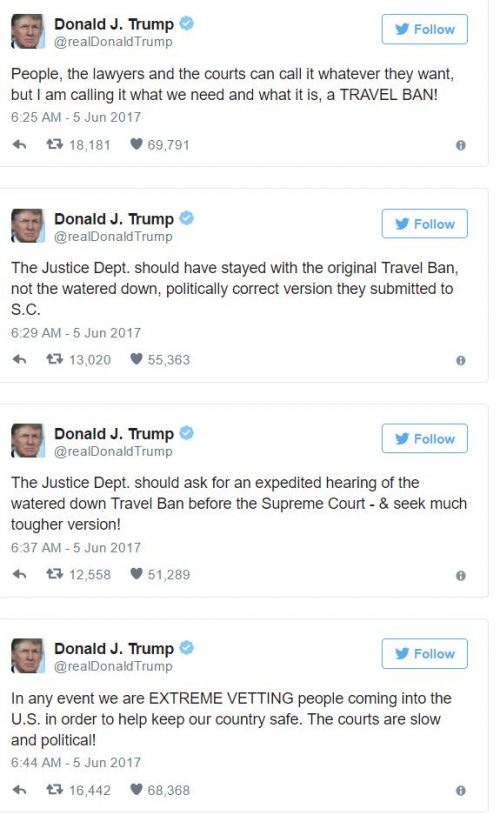
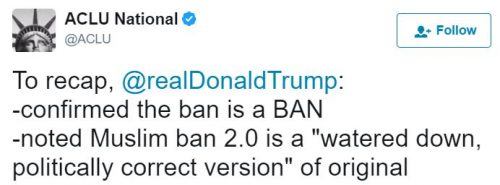
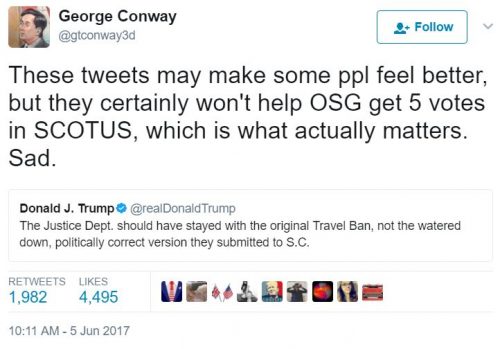







Comments
These tweets are neither here nor there. If you are a Justice who is swayed by a mere tweet then perhaps it’s time you should reconsider your job and do something else that doesn’t require a backbone (like becoming a Democrat or GOPe politician).
I agree with Trump in his tweet, his own justice department failed miserably by watering down the original ban to make it PC. I’m not seeing how an honest assessment could ever be a Bad Thing™
He’s trolling the [class] diversitists again.
It’s neither a ban nor does it affect the majority of Muslims or exclusively. And if the governments in the listed nations are competent, then any issues related to principled alignment (i.e. character), can be resolved in an orderly fashion. Hopefully, they don’t have a press or groups like the SPLC, and similar, that color the population with a broad brush (e.g. [class] diversity).
Elective wars and excessive immigration have consequences. Obama should have stood with the people in the nations that he targeted instead of forcing the refugee crises. The association that some, many special interest groups hope that people will not notice.
I posted this on the Forum this morning…
http://hotair.com/archives/2017/06/05/awkward-trump-blames-doj-watered-travel-ban/
Der Donald just tots pissed in his Wheaties, and cut the legs out from under his own DOJ.
Yep. He’s playing 9 dimensional chess.
Sessions must feel real supported today.
———————————————–
And, yah, the LEGAL effect is nominal. The Forth Circuit and others are simply wrong in their rulings.
But Der Donald is simply stupid in his messaging, and he badly hurt his own people today…without ANY reason except pique.
What on earth does Sessions have to do with it?
He was still a Senator when the second executive order was signed.
Actually, he was confirmed on February 8, 2 weeks after the first EO. The second ‘ban’ was issued March 5 or 6 so Sessions had been AG almost a month at that point. Injunction against ‘ban 2.0’ was granted 3-15.
Huh.
You’re right.
I withdraw my objection in full.
I think I was remembering the confirmation of Rosenstein as Deputy AG.
No idea what, if anything, Sessions had to do with this executive order, but in principle he could have.
OH, gorsh…
Is he the AG NOW? WAS he the AG nominee and advisor to Der Donald at all relevant times…???? Did or DID NOT Der Donald SIGN the second order…???
Or did I miss something…???
You seem to miss a lot.
YOU don’t just seem to…you DO…have trouble dealing with objective facts.
You know…reality? You remember that from before the pre-Trumpian fog. I hope…
I’ve noticed Hotair inching more and more left, and recently they’ve been approaching CNN and MSNBC levels of anti-trumpism and moonbattery. Their arguments are seldom cogent or insightful anymore.
“But Der Donald is simply stupid in his messaging, and he badly hurt his own people today…without ANY reason except pique.”
What about his ‘own people’ hurting him? This works both ways.
I doubt the relationship between Trump and Sessions will suffer as a consequence of those tweets. I’d be quite surprised to learn Trump had not already said the same thing to Session directly. Or that Sessions didn’t agree to some extent.
OK. Support…???
How ’bout this…
T-rump SIGNED the second order.
His legal people have taken a position DIAMETRICALLY opposed to what he stupidly tweeted.
The Prof. asys, “I agree that Trump would be an impossible client to represent for this very reason”.
And you fantasize some “collusion”…???
HAH…!!!
The professor also said the following:
“But perhaps he understands that this is not just a court fight, it’s a public opinion fight and he already knows how the media and punditry vote. They are not his audience.”
Trump speaks to the American people, not the gutless prog courts.
OK.
And he says stupid shit that contradicts his previous stupid shit, AND the messaging of his own DOJ.
So much winning…
Not ‘fantasizing collusion’. Just spitballing. Like you.
None of us ‘know’.
Could be my spitballing was off the mark:
http://abcnews.go.com/Politics/attorney-general-jeff-sessions-suggested-resign-amid-rising/story?id=47875090
Spicer’s dodging today only makes sense if Trump & Sessions are on the outs.
But isn’t that the issue in this case?
Haven’t some of the lower court judges essentially been saying that Trump’s rhetoric on Twitter overrules an otherwise valid and constitutional order?
The newly created Twitter exception to executive authority?
No. You have a chronology problem.
The lower courts are (wrongly) looking at T-rump’s (stupid and boob-baiting) campaign blather as indicative of his “real intent”. They only have any authority to read an EO within the “four corners” of itself.
No, that would be the long-enshrined ‘Campaign Pledge Exception’ to Executive Authority. You can look it up, to paraphrase Stengel.
Prof J:
and Rags:
But is that really so? Suppose this order were not about immigration, but about some ordinary government business, where it is firmly established that the fourteenth amendment and all the civil rights laws apply. Suppose a president were to issue an order to his employees which is facially neutral, but which has an impact on black people vastly disparate to that on other races, and a challenge is brought alleging that this disparate impact is deliberate, and is in fact the order’s true purpose.
I’m sure you’ll both agree that If this were indeed the case, if the court could read the president’s mind and determine that that’s what he really intended, then this hypothetical order would be illegal, despite its facial neutrality. But how do we determine this? Surely his statements, whether before, during, or after the campaign, would be relevant to determining his motive. If he had revealed an animus to black people then his order would be suspect, while if he had not then it wouldn’t be. If he’d publicly said he’d go after black people by means of just such an order, then surely that would be strong evidence that when he issued it this was his motive, regardless of how it’s phrased or what he claims now.
So no, I don’t think the courts’ error is in looking at his campaign statements or his tweets. I think their error is much more fundamental. To the best of my knowledge the controlling Supreme Court precedents on immigration are that Congress’s power is plenary regardless of motive. As I understand it the key case is the one upholding the Chinese Exclusion Act, which — despite that Act’s subsequent repeal — is still good law, and is still binding on all lower courts. The fourteenth amendment and the civil rights laws simply don’t apply. Now perhaps the Supreme Court was wrong, and the current Court would reverse it if given the chance, but that’s not for any lower court to say.
Your reasoning would justify a judge in blocking any government action merely because it was promulgated by someone he considers a political opponent.
The only way to avoid this is to allow judges to take action solely based on what the action actually is (that is, based on the text, not on speculation), not on what they think it means based on their personal evaluation of their opponents.
That is not, and has never been the law. When motive matters, as it does in cases of alleged illegal discrimination, it must be determined based on evidence, and that evidence is almost never in the text of the instrument at issue. In this case I don’t think motive matters, so it’s irrelevant, but in many cases it does matter, and campaign statements are precisely where any court would look for evidence of it.
Your gnat-staining is confusing you, Milhouse.
First, you seem to approve the use of “disparate impact analysis”, which is highly debatable in and of itself.
But this presents your own chronology problem; you have to have experience to show “disparate impact”. There isn’t any here. The courts acted preemptively.
Your hypo postulates a facially neutral EO. The courts have to give that deference. They cannot willy-nilly declare a facially neutral EO to be invidious without good cause.
Disparate impact is never itself discrimination; not even the 0bama DOJ dared openly claim that it is. The most they claim is that it ought always to raise a rebuttable presumption of discrimination. Like me, you probably think that goes too far, but surely you agree that disparate impact is often not an accident but the result of a discriminatory motive, and that such a motive, if it can be proven, renders even a facially neutral order or law invalid.
And no, you don’t need experience to show disparate impact. It’s often (as in this case) very easy to demonstrate it in advance. You surely don’t deny that if this order is implemented its impact will be disparate, simply because by its nature it affects many times more Moslems than anyone else. So if motive mattered, AND if it were proven that this disparate impact was no accident, then it would be invalid.
In this case I don’t think motive matters, so the whole inquiry doesn’t start.
Oh, my. The Left is all up in arms because he called it a ban.
Mark Twain used to ask, “If I say a tail is actually a leg, how many legs does a dog have?” The answer is “Four, because just calling it a leg does not make it so.”
He’s tweeting ‘Ban’ to a couple million followers.
The judges and the Justice Dept. know better. (although sometimes it is difficult to tell)
This is precisely Roberts’s reasoning in the first 0bamacare case. If Congress says a tax is actually a penalty, or that a penalty is actually a tax, that doesn’t change the reality. Things are what they are, not what someone calls them, and the courts may take judicial notice of the fact that Congress lies.
Funny how this principle only seems to work against conservatives.
That is not true. The precedent Roberts cited was from a case where the court struck down an unconstitutional penalty even though Congress called it a tax.
This is another example of T-rump’s First Rule, first stated a few weeks ago by a RedState writer in connection with his “why I fired Comey” set of lies…
“I said it; I’m glad; screw you.”
The article discusses what makes legal sense. If that were all that mattered we would never have had any of these nationwide injunctions, and if we have any they would have been laughed out at the appeals level.
That did not happen. We are well into the twilight zone here. Therefore the analysis in the article is somewhat off the point.
All that matters at this point is winning, so Trump (or OSG) chose the most ridiculously weak appellate ruling, one that was facially wrong at the time (it weighed Trump’s primary-season campaign statement heavily while ignoring his actual performance in office, the historic meeting of almost all Muslim countries in Saudi Arabia just the seek before. If SCOTUS doesn’t reverse this one, we really are out of options in this country.
And it could be exciting times ahead if SCOTUS votes for the 4th Circuit. Maybe we’ll have some foundational case on reversing Marbury v. Madison, maybe Congress will revoke the charters of inferior courts, the system will have failed and will need a cleansing. Because it will be clear that the value of our current setup has gone.
Trump’s comments are legally defensible, but also self-destructive. From the beginning the single most powerful weapon in stopping Trump was the intense hysteria and loathing he generates from his willingness to break “the rules” and antagonize those who oppose him.
This animosity has been so powerful it has resulted in many judges selling out their rational faculties, and becoming an American version of the Venezuelan judiciary.
But the whole object of Trump’s appeal to SCOTUS is to get five judges to think coolly and rationally. We know that four of them won’t. We suspect three of them will (Alito, Thomas, Gorsuch) and we HOPE Roberts and Kennedy will too.
The problem is, we know both of these two judges are quite capable of being intimidated, political and/or emotional. Roberts did it on Obamacare, and Kennedy has done it on many issues (e.g. Roe v. Wade, Gitmo detainee “rights”, gay marriage, etc.).
Trumps actions provokes and inflames; it provides the irrational hysteria needed to undermine his orders, and it may provide the tipping point against his EO’s (or give the court an excuse to dodge).
He is not doing himself any favors and, in my opinion, will deny him the five votes he needs.
Khan Sez UK Should Cancel President Trump’s State Visit
So, apparently Khan likes the idea of a “travel ban”